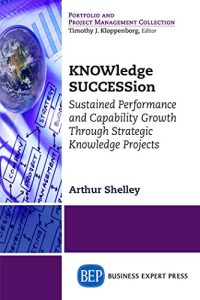One of the most interesting things about Arthur Shelley, the author of KNOWledge SUCCESSion, is the mixture of academic and pragmatic practice. Having a foot in both worlds creates a rigor in research that isn’t found in business books and a sense of what’s actually happening in the world that is all too often lost in academic writing.
Knowledge is Power
Shelley’s and my worlds – despite being on opposite sides of the planet – intersect in multiple ways. We share the same friends and the same interests in knowledge management and are thus involved in many of the same communities. At the heart of these intersections is the passion for finding ways for organizations to get more value out of the knowledge they have. By encouraging better knowledge capture and transfer, we both hope to improve corporate outcomes and the trajectory of humanity.
Despite the focus on knowledge, Shelley is clear that knowledge is only as useful as our ability to use it effectively. That is, when it’s shared and applied. It means nothing to know something that you can’t use when you need it.

Learning Today
One of Shelley’s criticisms of learning today – and one I share – is that we’re teaching people to memorize facts so they can answer standardized questions instead of teaching people to think for themselves and form their own opinions. We have maintained the historical learning model where the teacher is the fount of information, and they pour it into the heads of the students. The problem with this method is that it doesn’t work.
Malcolm Knowles et al. in The Adult Learner made it clear that adults learn differently from children, and using a pedagogical approach on adults doesn’t work. You must provide them context and relevance to what they learn. Going further than Knowles’ work, we realize that, today, we expect we can type a question into Google and instantly be presented with an answer.
The problem is that we often accept the first response in Google as THE response. That is, we fail to see that, for every situation, there are multiple opinions. Shelley likes to say that for every PhD, there’s an equal and opposite PhD. While this may be going too far in the direction of the uncertainty of truth, it is not an inaccurate statement. Many highly educated people vehemently disagree with one another in their field of study. What looks like certainty is Fractal Along the Edges.
Shelley advocates for an experiential learning approach. Klein’s work in Sources of Power indicates the real value and expertise can come from experience. Recognition-primed decisions (RPD) in particular are powerful ways that fire commanders convert their experience into life-saving guidance for the firemen under their command. However, Klein also admitted that recreating the conditions that would allow for this same experience to be produced more quickly proved to be difficult. Therefore, experiential approaches can be time-consuming.
Learning Organizations
The oldest blog post in my drafts folder is about learning organizations. It’s a collection of ideas that never quite fit together. Despite the subtitle of The Fifth Discipline, it never really explained how to create a learning organization. The reason for the struggles may be that organizations don’t learn, people do. While the idea that you structure your organization to create learning at every level is an ideal state, it’s not clear that anyone ever really gets there.
Instead of learning organizations, we seem to fall into defensive routines (see Dialogue), and we fail to fully explore others’ points of view for fear that they may be right and our perspective may be wrong. (See also Mistakes Were Made (But Not By Me).)
Adapting Knowledge
Two underlying themes in books on creativity and innovation (see Creative Confidence and The Innovator’s DNA) are that creativity and innovation exists inside of all of us and that our creativity is unleashed with a variety of experiences. In most cases, we don’t create new knowledge or innovations as much as we extend and adapt the knowledge from other areas and find new ways of applying it to solve new problems.
Knowledge has value directly for the problems that it’s designed to solve, and it can also be leveraged in new ways to create more value.
Perhaps you’ll find the knowledge you need to be successful in KNOWledge SUCCESSion.


No comment yet, add your voice below!